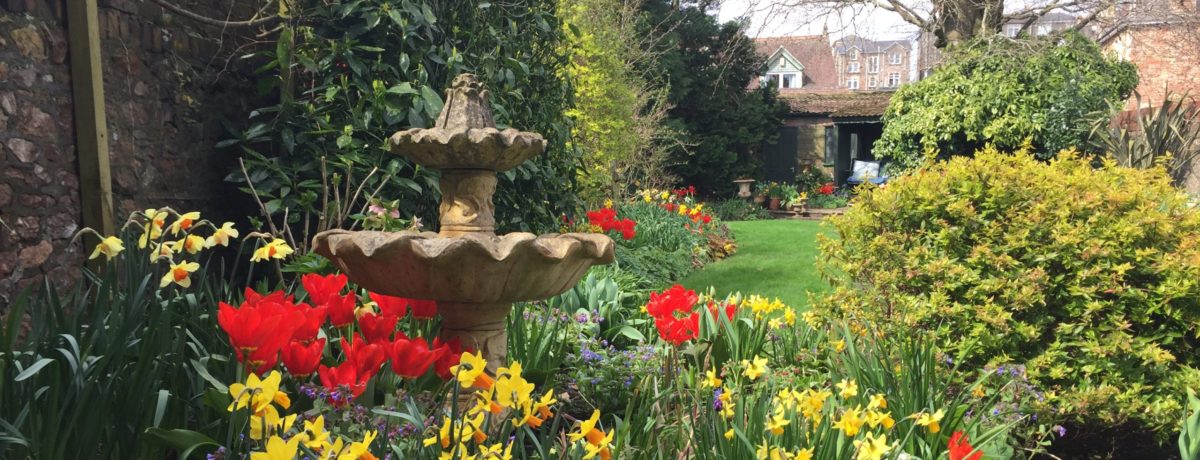Feest Isolation Days –20 May
The R number remains important to all of us. We take in so much information about the coronavirus that sometimes we forget to just leave it alone and have a little down time; a few of those moments when we just kick back and relax. The worry sits on our shoulders and we discuss it endlessly. All the unanswerable questions need to be left sometimes so that we don’t miss the abundant birdsong and the smell of the fresh cut spring lawns. Or the roses that are filled with such beauty. We still have tulips to enjoy and the weather means we can sit outside and enjoy warm, welcoming sun.
While we must indeed go forward I find myself looking back! My reminiscences yesterday of Richard Burton, the man from Wales, reminded me once more that my father’s family were coal miners. Although my grandfather didn’t work in the mines because he had become ill as a young man, all of his brothers went down the pit. My grandfather raised and supplied the men with the canaries that warned them if they needed to quickly make their exit and get above ground.
By the time I was in my early twenties, the mines that my relatives worked were closing. Friends and I visited a closed mine on a tour, and retraced the steps that the men would have taken most days. It was dreadful. The little train that took us down, down, down through the cold and the dark nearly touched the walls on either side of us. After we got past the layers of cold, we were then blasted with intense heat. The little train stopped and we got off and stood hunched over, the headlights of our helmets illuminating the seams of anthracite coal that was the black gold my Uncles were aiming to extract. We had to crouch down to see where the seams were, and there was little space to do that. Richard Burton talks of the skill of the miners and the respect and love they had for the mine. For some, it became a magical creature and for the talented, they could make their mark. A coal seam called the Great Atlantic Fault, begins in Spain in the Basque country and crosses the Bay of Biscay making its way to Wales and crossing underneath the Atlantic. The anthracite seam ends up in Pennsylvania. Welsh miners could be dropped down a mine in Pa and would instantly recognise the four-foot six seam. If struck by a powerful man who knew his job, one blow from this seam could produce a fallout of up to twenty tons of coal.
I couldn’t wait to get back up on the ground and stand on top of the coal once more. We went up and up finding first the cool layer of air then the cold layer before we alighted on the ground. When we arrived, we were taken into a huge room where the men headed when they left the mine. They stripped and placed their work clothes on metal hooks that had been lowered to the concrete ground, before they headed to a communal shower. Their filthy clothes were raised into the air and they would wear them again for the next days until the week was over. Pay day meant they changed gear and took the filthy clothes home to be washed. These images are not kind or gentle. The men were tough and resilient. They worked and lived closely together. Their shared experiences bonded them to each other in ways that no one else could ever know. The man from Wales tells us that every young man’s ambition was to become a miner and to learn the “arrogant strut of the Lords of the coal face.”
Many years ago, I found myself in Abergavenny sitting in a restaurant on my own in one of those places where people share long tables. The gentleman and his wife sitting next to me started speaking and the conversation turned to mines and mining. He had been the foreman of a mine all of his working life, and lost a few fingers to the coal. When I explained I grew up in Pennsylvania, and my ancestors had been miners, the shared connection was complete.
After they left, I went to the counter to pay my bill. The girl behind the counter told me that she was told to say, any relative of the miners is one of ours, wherever you are in the world. My bill had been paid. I felt an overwhelming sense of how communal the miners’ world was. It was humbling.
If there is anything that the coronavirus has reminded us, it’s that we, too, are indeed all interconnected. Some things never change, if only people would remember that!

With love
Kathy x

Great post Kathy – to me, you’ve got brilliantly convincing scenario there for a fascinating novel.
The field work research for atmosphere already completed and some wondrous inside track eg the clothes lines (ergh…) and your canary-breeding Grandfather.
Way to go…!
Letters and diaries possibly available? or can be imagined… There’s a slim book out recently from Cornish poet Mary J Oliver called ‘Jim Neat’. About her father. She wove memories and the sort of telling stuff you have access to together with some poems in a very intriguing and poignant way
Jxx
I shall look up Jim Neat! Thanks. Funnily enough the first novel I wrote was set in this place. The second is as well! These things do stay with you….. How’s yours going? Kx